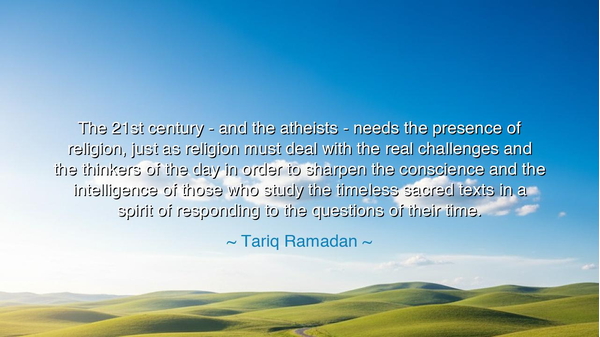
The 21st century - and the atheists - needs the presence of
The 21st century - and the atheists - needs the presence of religion, just as religion must deal with the real challenges and the thinkers of the day in order to sharpen the conscience and the intelligence of those who study the timeless sacred texts in a spirit of responding to the questions of their time.






In the profound and reflective words of Tariq Ramadan, the scholar of faith and reason, we find a truth that bridges the ancient and the modern: “The 21st century – and the atheists – needs the presence of religion, just as religion must deal with the real challenges and the thinkers of the day in order to sharpen the conscience and the intelligence of those who study the timeless sacred texts in a spirit of responding to the questions of their time.” This statement is not merely an observation of belief, but a call to dialogue, a reminder that truth is not born in isolation, and that both faith and reason, spirit and skepticism, must engage one another if humanity is to grow in wisdom and moral strength.
To understand the origin of this quote, one must see it in the light of Ramadan’s lifelong effort to reconcile faith with modernity. A Muslim philosopher and theologian descended from a lineage of reformers, he has long argued that religion should not retreat from the world, nor should the world exile the sacred. His words speak to a civilization torn between extremes: on one side, a militant secularism that rejects the soul, and on the other, a rigid religiosity that rejects the mind. In this tension, Ramadan sees not a division to despair over, but a necessary struggle — for it is in tension that the intellect and conscience are sharpened, just as iron sharpens iron.
When he declares that the 21st century needs the presence of religion, he is not calling for dogma’s return to power, but for the reawakening of moral imagination. Science and progress, though mighty in their reach, cannot alone answer the human cry for meaning. The age of technology, glittering with invention, still trembles beneath questions that are ancient and eternal: Why do we exist? What is good? What is just? It is here that religion — not as control, but as conscience — becomes indispensable. For without a compass of the soul, the cleverness of man may lead him not to light, but to ruin.
And yet, Ramadan’s wisdom cuts both ways. Religion too must engage with the thinkers and challenges of the age, or it becomes fossilized — a relic admired, but lifeless. The sacred texts, he reminds us, are not mute monuments of the past; they are living fountains, meant to be approached anew in every generation. The one who studies them must not flee from the questions of their time, but respond to them, interpreting eternal truths through the lens of changing realities. As once the philosophers of Athens challenged the faith of the early Church, and as Averroes and Aquinas each wrestled to unite reason and revelation, so too must the modern believer think deeply, question bravely, and renew the meaning of belief.
Consider the story of Moses at the burning bush, a moment when the eternal spoke through the fire of the temporal world. The fire did not consume the bush, and neither should modernity consume the sacred. The flame of reason can burn beside the root of faith without destroying it. In every age, the divine and the intellectual must meet, for together they purify one another. Religion without thought becomes tyranny; reason without spirit becomes emptiness. Ramadan’s quote is the modern echo of this eternal balance — that humanity must dwell between heaven and earth, neither blind in belief nor barren in doubt.
Thus, the meaning of his words stretches beyond theology into the very fabric of civilization. The atheist, though rejecting faith, still seeks truth and justice; the believer, though embracing the divine, must still face the realities of the age. Each needs the other. The skeptic reminds the faithful not to grow lazy in belief; the faithful remind the skeptic that truth is not found by reason alone. In this sacred dialogue, both are refined — the conscience deepens, the intelligence widens, and the heart of humankind becomes wiser.
And so, O seeker of balance, take this teaching to heart: do not fear the clash of ideas, for from that clash arises clarity. Read your sacred texts, whatever they may be, with eyes unclouded by fear. Listen to the questions of your time — of science, of doubt, of justice — and let them lead you deeper, not further, into the mystery of truth. Be a bridge between belief and reason, between tradition and progress. For the true strength of faith lies not in silence, but in its courage to speak to the living world. And in that dialogue — between the eternal and the immediate, the divine and the human — you will find what Ramadan calls us toward: a sharper conscience, a deeper intelligence, and a sweeter harmony between the mind and the soul.






AAdministratorAdministrator
Welcome, honored guests. Please leave a comment, we will respond soon